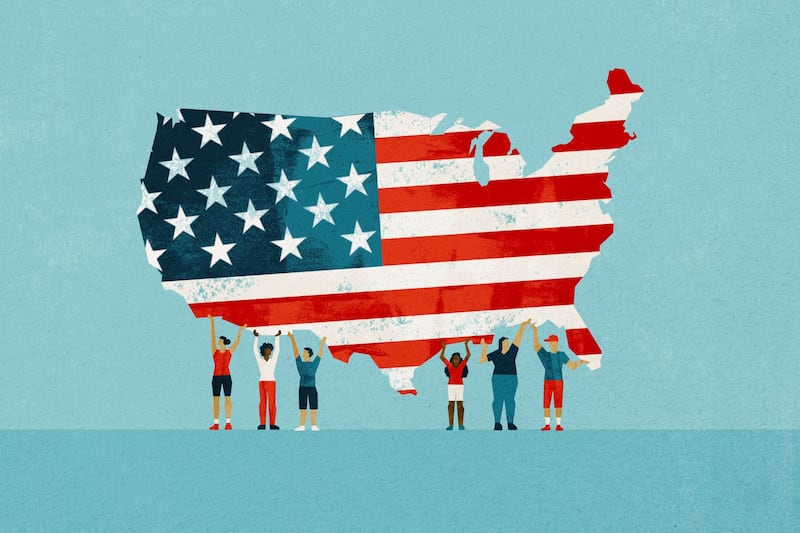Are Americans losing their grasp on the unique style of democracy and representative government that has been a beacon to the world?
It may seem fashionable to answer yes to this question. Certainly, polls — including the most recent one commissioned by the Deseret News and the Hinckley Institute of Politics, conducted by HarrisX — offer some support in that direction. Not only does the nation have a deepening political divide, but political party members also show little trust in institutions run by members of the opposite party.
Meanwhile, it seems to be fashionable to express distrust in institutions, from government agencies to schools and beyond.
A history of challenges
And yet, we answer an emphatic no to the question. American democracy is not failing, nor will it yield to some other form of government. The nation has suffered many deep divisions in its history, from the Civil War to the civil rights marches and anti-war protests of the 1960s.
At times, grievances boil over, as they did in numerous protests and riots in the summer of 2020 or with the Jan. 6, 2021 attack on the nation’s Capitol. In the moment, these may seem catastrophic. However, the constitutional framework has held. Though it may temporarily have been bent a bit in one direction or another, American democracy tends to be self-correcting.
The United States never has been a perfect union, but from the very beginning of its founding, the nation has sought “to form a more perfect union.” We work at it, within the battle-tested institutions of balanced, representative government and a belief that society is bettered by strengthening families and providing opportunity for all individuals.
Americans continue to exhibit goodness, especially outside the political realm. And much of that is connected to organized religion and the right to practice that religion, the secret sauce to the nation’s enduring success protected in the First Amendment to the U.S. Constitution.
Charitable giving
Exhibit A could be the fact that Americans, collectively and voluntarily, donated $592.5 billion to charities in 2024, which was a new high in a nation known for sharing its wealth freely with others, according to Giving USA.
Yes, much of this giving includes corporate donations, bequests and the contributions of foundations, as well as the giving of individuals. Yes, there were tax advantages to be gained. But these reveal the strength of what matters to Americans. All were decisions made by human beings for the betterment of others, and in lieu of other strategies and other tax breaks.
People and organizations in failing nations tend not to give so freely to help others. Charitable giving is a sign of optimism, an act of faith that the donation will do some good and that it will make a difference in the world. It also acknowledges a need to reach out and help others, regardless of ideology.
Poll results
The Deseret News/Hinckley Institute of Politics poll measured the trust that registered Utah voters have in various institutions, from public universities to courts, elected officials and elected bodies, such as Congress.
None scored particularly high. Democrats had far less confidence in Congress than Republicans, with 57% of Democrats expressing zero confidence versus 22% of Republicans. Concerning the Utah Legislature, 47% of Democrats expressed zero confidence, compared to 12% of Republicans. Roughly the same figures held for the U.S. Supreme Court, with fewer expressing such views about the governor or the state Supreme Court.
Perhaps one should expect such results from people who identify with the party that is out of power. Were Democrats in power, Republicans might express similar disdain.
However, one institution — Utah colleges and universities — drew bipartisan support, with more than 30% of both parties expressing “a great deal” of confidence and almost 60% showing at least some confidence. Only 12% had zero.
This was considerably better than how respondents felt toward such institutions nationwide. We note the difficult work done by both the Legislature and the presidents and other leadership of Utah’s colleges and universities toward reaching compromise where disagreement appeared. They were willing to do the work toward good, not abandon the institutions.
Proximity breeds confidence. The more that people interact with those working and living within institutions, the less cynically they behave toward them. Many Utahns know people who attend, teach or are otherwise associated with Utah institutions of higher learning. They have a degree of personal knowledge about these places.
The need for associations
A key toward leveling this age of suspicion and demonization, then, is for people of all philosophies to become better acquainted with one another. May we suggest that a natural place for this to flourish is a church, regardless of denomination.
To emphasize this point, the Philanthropy Roundtable website quotes Harvard sociologist Robert Putnam, who said almost half of all “associational” activity in the U.S. is church-related.
The Roundtable’s report on religion and generosity quoted Pastor Tim Keller saying, “As a whole, secularism is not good for society.” Secularism “makes people very fragmented — they might talk about community, but they aren’t sacrificing their own personal goals for community, as religion requires you to do.”
A recent survey by the Pew Research Center found that a consistent 60% to 64% of Americans have identified as Christians since 2020, with 6% to 7% identifying with other religions. While the percentage of religious Americans has been in a long-term decline, more than two-thirds of the nation still falls into that category.
No, American democracy is not on the verge of disappearing. Americans are much deeper than the sum of their political beliefs. And as we gather, we learn not just how to help, but who to help.

